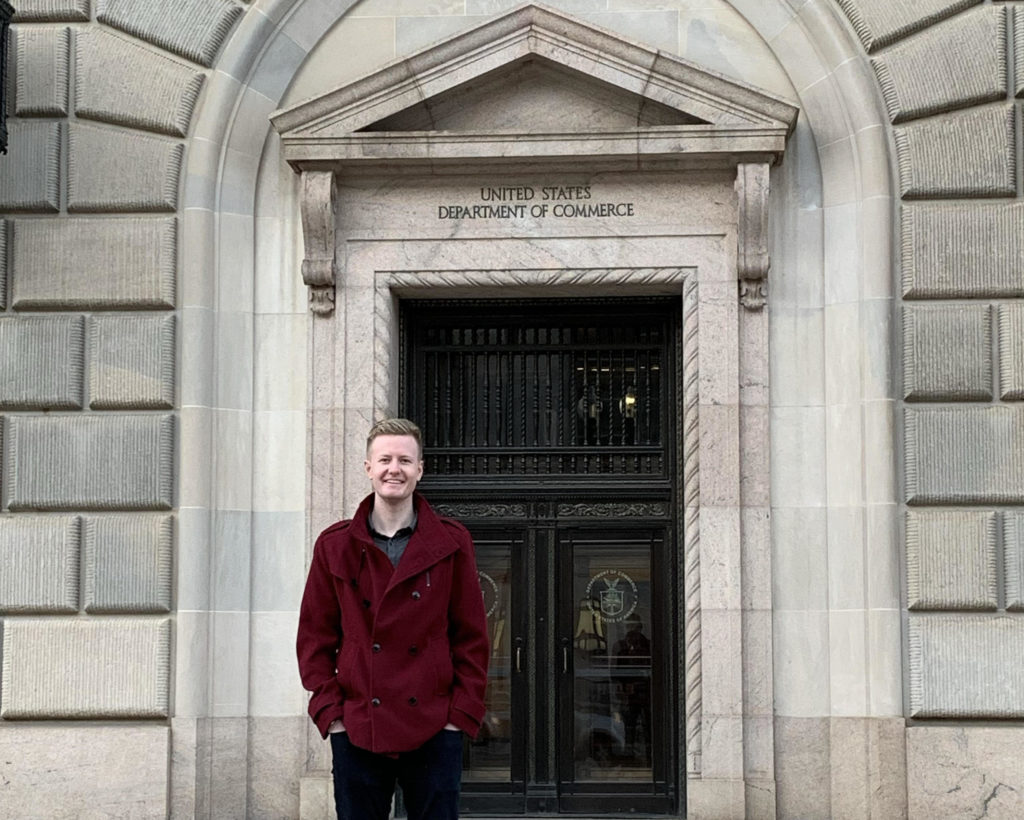Once a Husky, Always a Husky

Wil at the U.S. Department of Commerce, as an International Trade Administration Intern
Wil Engstrom is a student in the Foster Master of Science in Business Analytics Class of 2021, however, his tenure as a husky started long before this. Wil grew up in Seattle, and always dreamed of attending the Public Ivy in his backyard. Wil achieved this goal by receiving his undergraduate degree, a B.S. in Economics, from the University of Washington (UW) and is a self-proclaimed “husky, through and through.” He’s a “Double Dawg” as he earned not only a bachelor’s degree, but is also working on his MSBA degree from UW.
Why Foster MSBA
What attracted you specifically to the Foster MSBA program?
Growing up in Seattle, I was always aware of Foster’s prestigious reputation. Attending the University of Washington for my undergraduate education cemented the notion for me, that this [Foster] is the best business school, in the Northwest, and quite possibly in the United States, as well. After receiving my undergraduate degree in economics, I knew I wanted to build upon both the business and technical facets of my potential, and after doing some research, I found that the Foster MSBA program fulfilled both.
What has been your favorite class so far?
During fall quarter, we had a class on Customer Analytics (BUS AN 513), which was taught by Professor Oliver Rutz. He is not only an amazing professor but also the Faculty Director for the MSBA program. This course really opened my eyes to all the different ways we can apply the fundamentals of business analytics to real-world problems. For example, my classmates and I were given a consumer dataset for a winery, and we were tasked with cleaning and analyzing the data in order to suggest ways for the winery to improve its business. I look forward to continuing to complete projects like this from the firm’s perspective in Analytics for Firm Decisions (BUS AN 514) over winter quarter.
What are some of the connections that you have made or are hoping to make through the program?
The structure of the MSBA program is designed in such a way that students will be in two small teams; one for the summer and autumn quarters, and then another for the winter and spring quarters. My first team was great about meeting multiple times a week regardless of whether it was necessary for academic reasons, we took the time to get to know about each other’s passions, goals, and day-to-day lives. We also openly discussed our strengths and weaknesses within the business analytics field so that we could best support each other, as classmates and friends.
We recently started getting to know our second teams, but I’m hoping we implement something similar. There has been a lot of talk about meeting in a socially distanced way, either on campus or on a local hike once the weather allows for it.
In addition to MSBA activities, there are a lot of co-curricular opportunities available through Foster. Along with fellow MSBA students, I participated in the Adobe Analytics Challenge, and with other Foster graduate students, I participated in the Small Business School Challenge.
By participating in the Small Business School Challenge, I saw how valuable data-driven insights could be for smaller organizations that don’t have entire teams dedicated to analytics, like bigger companies do. For the challenge, my team and I worked with a small business in Northern California aimed at getting youth involved in sports. It was gratifying work, and it’s amazing to know that some of the kids helped by this organization will grow up to play college and professional sports.
Looking Ahead
What do you hope to accomplish after you graduate?
Before joining the Foster MSBA program, I wasn’t completely sure, but I knew I wanted to be part of the ongoing initiative to integrate business with technological concepts. In the past, my internships with MCG Health and the International Trade Administration showed me first-hand how data can be leveraged to make valuable insights that otherwise wouldn’t be made.
As an MSBA student, I have the opportunity to arrange conversations with career counselors through Foster Career Services and I made sure to take advantage of this. It was great to receive some guidance and be reassured that I wasn’t the only person who was unsure of their future path.
By talking with career counselors at Foster, I was able to realize how strong an impact the Small Business School Challenge had on me. It led me to the conclusion that although I do want to work in analytics, I would prefer to work with smaller companies, ideally involved in cultivating social impacts.
What is the advice you would give to current UW students considering the Foster MSBA program, like you, once did?
I would say just go for it—reach out to the program advisors and ask to get connected to a current student, like me!
If you are a current economics student at UW, I would even recommend taking some of the more data-oriented courses like Computational Finance and Financial Econometrics (ECON 424) and Data Science for Strategic Pricing (ECON 487).
It’s never too early or too late to start learning about the world of business analytics.
Want to hear more about students like Wil? Check back regularly to learn more about the current cohort of MSBA students!
Written by Maryam Noor
MSBA Writer & Content Strategist
[email protected]
